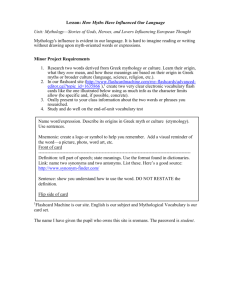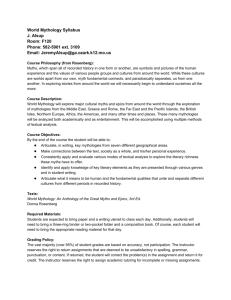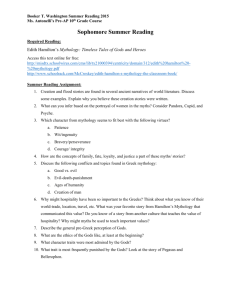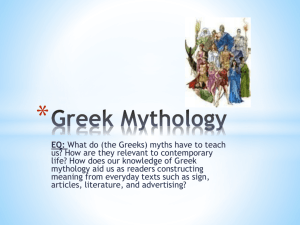Introduction to World Mythology Course Information
advertisement
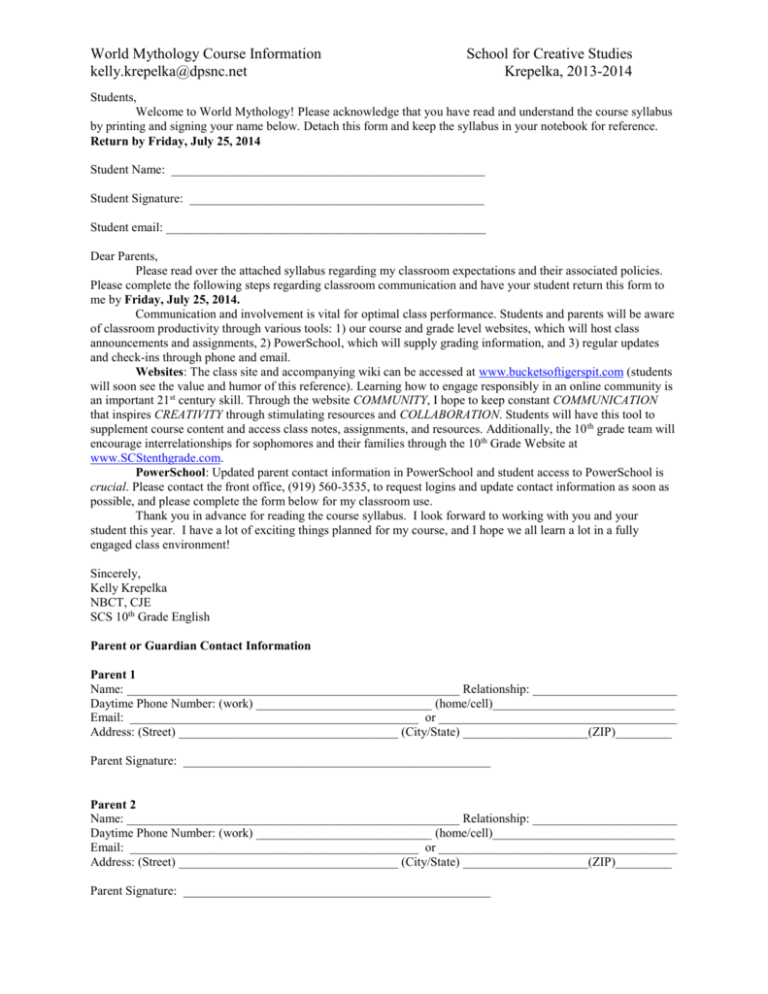
World Mythology Course Information kelly.krepelka@dpsnc.net School for Creative Studies Krepelka, 2013-2014 Students, Welcome to World Mythology! Please acknowledge that you have read and understand the course syllabus by printing and signing your name below. Detach this form and keep the syllabus in your notebook for reference. Return by Friday, July 25, 2014 Student Name: __________________________________________________ Student Signature: _______________________________________________ Student email: ___________________________________________________ Dear Parents, Please read over the attached syllabus regarding my classroom expectations and their associated policies. Please complete the following steps regarding classroom communication and have your student return this form to me by Friday, July 25, 2014. Communication and involvement is vital for optimal class performance. Students and parents will be aware of classroom productivity through various tools: 1) our course and grade level websites, which will host class announcements and assignments, 2) PowerSchool, which will supply grading information, and 3) regular updates and check-ins through phone and email. Websites: The class site and accompanying wiki can be accessed at www.bucketsoftigerspit.com (students will soon see the value and humor of this reference). Learning how to engage responsibly in an online community is an important 21st century skill. Through the website COMMUNITY, I hope to keep constant COMMUNICATION that inspires CREATIVITY through stimulating resources and COLLABORATION. Students will have this tool to supplement course content and access class notes, assignments, and resources. Additionally, the 10 th grade team will encourage interrelationships for sophomores and their families through the 10th Grade Website at www.SCStenthgrade.com. PowerSchool: Updated parent contact information in PowerSchool and student access to PowerSchool is crucial. Please contact the front office, (919) 560-3535, to request logins and update contact information as soon as possible, and please complete the form below for my classroom use. Thank you in advance for reading the course syllabus. I look forward to working with you and your student this year. I have a lot of exciting things planned for my course, and I hope we all learn a lot in a fully engaged class environment! Sincerely, Kelly Krepelka NBCT, CJE SCS 10th Grade English Parent or Guardian Contact Information Parent 1 Name: _____________________________________________________ Relationship: _______________________ Daytime Phone Number: (work) ____________________________ (home/cell)_____________________________ Email: ______________________________________________ or ______________________________________ Address: (Street) ___________________________________ (City/State) ____________________(ZIP)_________ Parent Signature: _________________________________________________ Parent 2 Name: _____________________________________________________ Relationship: _______________________ Daytime Phone Number: (work) ____________________________ (home/cell)_____________________________ Email: ______________________________________________ or ______________________________________ Address: (Street) ___________________________________ (City/State) ____________________(ZIP)_________ Parent Signature: _________________________________________________ World Mythology Course Information kelly.krepelka@dpsnc.net School for Creative Studies Krepelka, 2013-2014 Introduction to World Mythology Course Information Instructor: Kelly Krepelka, NBCT, CJE, kelly.krepelka@dpsnc.net, (919) 560-3535 Office: Room 122, M-F 9:00-10:15 a.m.; Drive: kelly_krepelka@dpsnc.net Class website: www.bucketoftigerspit.com; School website: http://scs.dpsnc.net/pages/School_for_Creative_Studies Course Description This course examines myths from around the world, emphasizing the ways in which they continue to give insight into the human condition; moral questions, the nature of reality, the perceptions of the supernatural and our human relationships with one another. We will examine methods of studying myths and apply those methods to the myths we learn. Student Learning Outcomes: By the end of the course, students will be able to: Understand myths from various cultures in terms of origins, nature, categories and functions Identify and describe archetypes and their significance Understand the representation of individual, cultural, social, political and sexual/gender identity in myth Comprehend myths of various cultures within the context of the creator culture through use of supporting disciplines such as history, linguistics, archaeology, anthropology, philosophy and psychology Speak and write fluently when analyzing, comparing, synthesizing, and applying myths from various cultures. Appreciate the history of various cultures through acquaintance with religious beliefs, practices and rituals Class Expectations Rules: Students are expected to consistently demonstrate respect, responsibility, scholarship, kindness, integrity, and self-discipline and perform the Habits of Mind. The first week of school, students will develop a set of classroom rules that demonstrate their desired character traits. Students are also responsible for school procedures and the following class policies: (1) Be in your seat when it is time to begin class. (2) Follow directions the first time they are given. (3) Raise your hand and wait for permission to speak. (4) Stay in your seat unless you have permission to do otherwise. (5) Be respectful at all times. (6) No electronic devices other than school approved equipment. (7) No food, drinks, or gum in class. Consequences: Violation of class and school expectations and policies will have the following consequences: (1) Verbal Warning (2) Reflective Lunch (3) Student Conference in Hallway (4) Contact Parent/Guardian (5) Office Referral. Additionally, cheating in any form (copying from another student, plagiarism, purchasing work, deception that creates an unfair advantage) is unacceptable and will have very serious consequences. If caught cheating, the assignment will receive a zero and you will be referred to an administrator. World Mythology Course Information kelly.krepelka@dpsnc.net School for Creative Studies Krepelka, 2013-2014 Additional Policies: (1) Restroom: Students should primarily go to the restroom during class change. However, students will be permitted to go to the restroom during class a maximum of one time per week. Students must sign the sign-out sheet on the door and sign back in when they return. If students choose to go to the restroom more than this, students will need to make up the time the missed in class in a reflective lunch. (2) Tardies: If a student is inexcusably late to school or late for class without a pass, the student will be assigned a reflective lunch. Note that the student will be assigned a reflective lunch for each tardy that the student receives. (3) Progress Reports will be sent out according to the Durham Public Schools Calendar. Students must get the progress report signed by a parent/guardian and returned within one week. (4) Laptops will be checked out beginning Monday, July 22nd. Laptops will be checked out between 8:30-9:00. If a student arrives late to school and it is unexcused, the student will not be able to check out a laptop for that day. Students must return required paperwork and the $25 Activity fee before the student will be able to checkout a laptop. Homework: Students should expect daily homework and reading assignments outside of class for successful completion. Students will be given a tentative breakdown of quarterly readings and assignments as well as unit schedules. Be prepared for daily discussions and reading quizzes and must submit all homework assignments at the beginning of class on the date due. Late work and Make-up Work: is an essential component of success. To receive full credit for an assignment, the student must turn it in at the beginning of class. In the event of missing work, students have a maximum of one week to make up work for a maximum credit of 80%. Students are responsible for checking the class website or requesting work from the school or teacher on days that they are absent for any missed assignments. Any handouts that the student may have missed will be placed in the class folder. It is the student’s responsibility to check outside of class time THE DAY S/HE RETURNS for any missing work, handouts, and instructions. Grading: Major Assessments (tests, projects) Intermediate Assessment (essays) Minor Assessment (quizzes) Discussion (seminars, class work and homework) 40% 25% 20% 15% Exams: Students will also take a midterm and final exam. The final exam is worth 20% of the final grade. Resources Materials: (1) Loose leaf paper and three-ring binder; (2) Red, Black, and Blue Pens; (3) No. 2 pencils’ (4) Note cards; (5) Sticky notes; (6) Highlighter; (7) Colored pencils; (8) flash drive Proposed Texts: Rosenberg, D. (1994). World Mythology: An Anthology of the Great Myths and Epics (2nd Edition); Hesiod’s Theogony; Homer’s The Illiad; Ovid’s Metamorphoses; Virgil’s The Aeneid; Yann Martel, The Life of Pi; Joseph Campbell, The Hero with A Thousand Faces; Christopher Vogler, The Writer's Journey: Mythic Structure for Writers. Texts may be added or removed according to availability and class needs.
